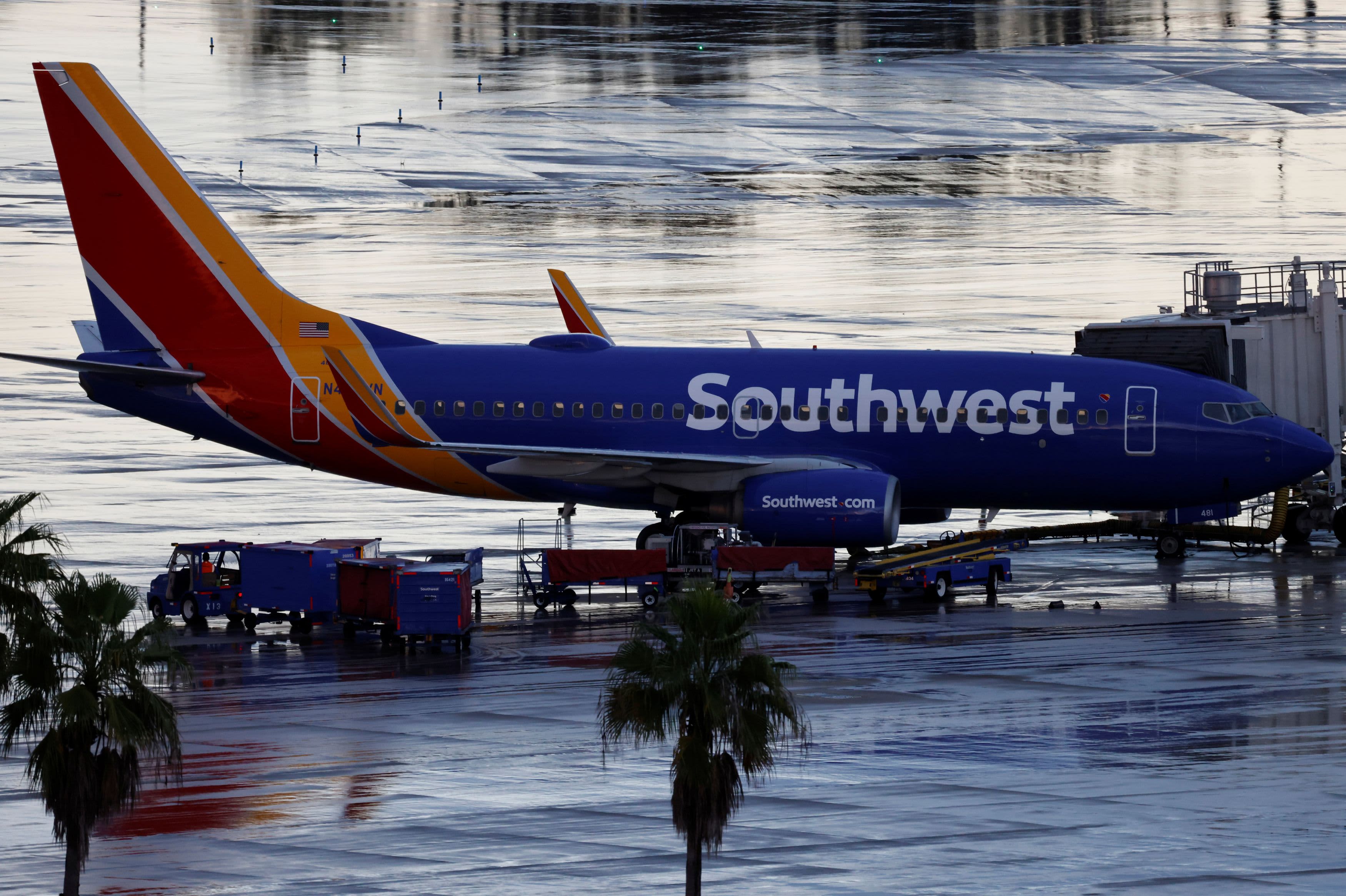
Airlines canceled hundreds of weekend flights and thousands more were delayed as thunderstorms in Florida slowed traffic in one of the country’s top travel destinations during spring break.
More than 6,000 U.S. flights were delayed and 1,930 were canceled on Saturday, according to flight-tracking site FlightAware. Disruptions continue on Sunday with nearly 1,540 canceled and more than twice that number of delays, though Monday schedules appeared to stabilize.
Thunderstorms are especially challenging for airlines because they are harder to predict and plan for compared with other weather like winter storms and hurricanes, during which airlines often cancel flights hours if not days in advance.
Disruptions due to storms tend to cascade because crews and planes are left out of position for their assignments.
Southwest Airlines canceled 520 flights, or 14% of its Saturday schedule, and had 1,512 delays or 43% of scheduled flights, according to FlightAware. About 400 flights, 10% of Southwest’s Sunday schedule, were canceled and another 25%, more than 900, were delayed.
Before the storms sparked delays in Florida, the airline had briefly paused departures early in the day to perform checks on a backend system that it had reset as part of regular maintenance overnight. Those systems are used for tasks including pre-departure paperwork.
Southwest said some of its crew members couldn’t find hotel rooms amid the disruptions, something crews complained about last year.
“With widespread cancellations in the midst of a busy travel season, hotel rooms were unavailable in a few cities, and late day Crew timeouts in those cities meant that some Crew Members were left without rooms,” Southwest said in a note to crews on Sunday, which was seen by CNBC. “We take that shortfall seriously and are working to follow up with affected crew members.”
The airline waived fare differences for affected customers so they can rebook themselves online without waiting on the phone, a spokesman said. The airline started the day with about 400 cancellations because aircraft and crews were out of position after Saturday’s weather, the spokesman added.
Air traffic controllers had slowed or paused inbound traffic altogether at several Florida airports Saturday, including Orlando International Airport, Miami International Airport and Tampa International Airport. Close to a third of Orlando departures were canceled and 42% were delayed.
“Yesterday’s weather in around Florida and resulting [air traffic control] initiatives impacted our operations with most northbound and southbound routes through and to Florida affected, American Airlines said in a statement. “We’re recovering from those disruptions today.”
More than 65,000 American Airlines customers, including those on regional airlines, were impacted by the disruptions on Saturday, according to an internal tally, which was reviewed by CNBC. About a third of cancellations were tied to a lack of crew availability.
Dennis Tajer, spokesman for the Allied Pilots Association that represents American’s pilots, said the airline needs to improve its technology to better allow pilots to pick up flights when there are disruptions.
Delta Air Lines said that the Florida weather also impacted its operation on Saturday. About a fifth of Delta and American’s schedules were delayed, roughly 600 flights apiece. American had also canceled 363 flights, or 12%, while Delta had canceled 238, or 8%.
On Sunday, more than 500 American mainline flights were canceled or delayed, while Delta had 41 canceled flights and 366 delayed.
A third of Miramar, Fla.-based Spirit Airlines‘ flights were canceled and a fifth were delayed. JetBlue Airways scrubbed a third of its schedule on Sunday, with another 31% delayed. New York-based JetBlue has a large presence in Florida as well as the Northeast.
Airlines are currently scrambling to staff up to handle the travel demand that surged as Covid cases declined this winter. Staffing shortages worsened flight disruptions last year.
Delta, American and Alaska Airlines pilots have picketed at airports in recent weeks as their unions push carriers’ management for better pay and more predictable schedules.
On Friday, Alaska Airlines canceled more than 100 flights and close to 80 more on Saturday. Some of its pilots had picketed at several West Coast airports Friday over a lack of progress in contract negotiations with the airline.
“Alongside other carriers, we continue to be impacted by a national pilot shortage and the required training regimen to bring new pilots onboard,” the airline said in a statement, which did not mention the pickets.
Airlines have increased flying to cater to customers returning after two difficult pandemic years but pilots and flight attendant unions have frequently complained about packed schedules and stresses on the road, such as a lack of hotel rooms or difficulty reaching company scheduling services.
“The choke point has been in getting everyone trained as we’ve ramped the airline back up and returned aircraft to service throughout the pandemic,” Spirit Airlines CEO Ted Christie told an industry event Thursday.
This article was originally published on CNBC

